National Hurricane Preparedness Week May 23 - 29
 Friday, May 28, 2010 at 7:59AM | |
Friday, May 28, 2010 at 7:59AM | |  Email Article
Email Article The CDC sent me a message the other day asking that I post some information on Hurricane Preparedness.
Hurricane Hazards
• The Atlantic Hurricane Season begins on June 1 and ends on November 30.
• Hurricanes threaten health and safety in several ways -- storm surges, high winds, tornadoes, and flooding.
• Knowing your risks before, during and after a storm, and what actions you should take, you reduce the effects of a hurricane disaster.
Steps for Consumers
• Get a Kit – When preparing for hurricane season, consider your basic needs after a storm: fresh water, food, lifesaving medications, clean air and warmth. Stock up on the supplies you would need if a hurricane disrupts power and services.
• Make a Plan – Your family may not be together when disaster strikes, so it is important to plan in advance: how you will contact one another; how you will get back together; and what you will do in different situations. Remember to plan for the safety of all family members, including your pets.
• Be informed – Learn more about hurricanes and other potential emergencies that could happen where you live and how to respond to them. Find out about the emergency plans that have been established in your area by your state and local government. Listen to weather reports and government sources to stay on top of developing storms that may threaten your community.
Additional Resources
- CDC’s National Hurricane Preparedness Week Page: http://www.cdc.gov/Features/HurricanePreparedness/
- Hurricane Health and Safety: http://emergency.cdc.gov/disasters/hurricanes/
- Emergency Preparedness and You: http://emergency.cdc.gov/preparedness/
- Government-wide Ready Campaign: http://www.ready.gov/
- Preparing for a Hurricane: Basic steps you can take now to ensure your safety should a storm hit.
- Emergency Supplies You Will Need: Stock your home and your car with supplies.
- Make a Plan: Learn the basic steps you can take to prepare for a storm
- Prepare to Evacuate: Never ignore an evacuation order.
- If You Are Ordered NOT to Evacuate: Things you can do to get through the storm in the safest possible manner.
- Protecting Pets: Ensure your pet's safety before, during, and after an emergency.
After you have read these tips, please review the other resources available on the CDC Hurricanes Web site.
CDC strongly recommends that you print all important resources before a hurricane strikes. Power outages during and after a hurricane can prevent you from accessing information online when you most need it. Preparing now can help keep you and your family safe.
You can receive weekly tips from CDC throughout hurricane season by signing up for the following:
- CDC Hurricane Health and Safety Updates — subscribe and get tips of the week sent to your email or mobile phone.
- CDC Hurricane Public Service Announcements (PSAs) and Podcasts







